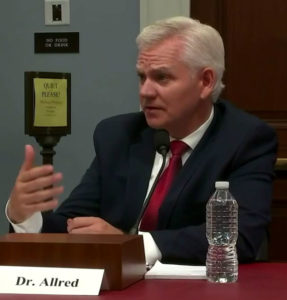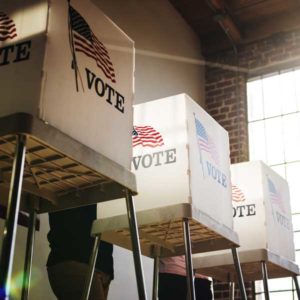We are ready to pick our next set of issues for which we’ll develop full policy briefs.
It’s an exciting time to do this. The first time we picked our issues, we had 4,000 members. Now, over 25,000 Americans from across the nation and political spectrum have joined our work to bring common sense to Washington. We have also now established an excellent reputation in Congress. In December, Congress passed legislation ending surprise medical billing with support from thousands of CommonSense Americans that made a meaningful difference.
 On March 25, 2021, Keith Allred, our executive director, testified for a second time before Congress on how we identify and champion solutions wise enough to attract broad, bipartisan support. The Select Committee on Modernization of the Congress was particularly interested in our brief on Congressional Reform, which our members are weighing in on right now. Our work to identify bipartisan solutions is especially relevant in a Senate evenly divided with 50 Democrats and 50 Republicans and one of the most closely divided Houses in history.
On March 25, 2021, Keith Allred, our executive director, testified for a second time before Congress on how we identify and champion solutions wise enough to attract broad, bipartisan support. The Select Committee on Modernization of the Congress was particularly interested in our brief on Congressional Reform, which our members are weighing in on right now. Our work to identify bipartisan solutions is especially relevant in a Senate evenly divided with 50 Democrats and 50 Republicans and one of the most closely divided Houses in history.
Picking our issues to brief is the first of our four steps in identifying and championing solutions wise enough to attract broad, bipartisan support. Once we’ve picked our three issues, we’ll take the second step of developing full policy briefs. The staff will be working hard in the coming months to make the strongest case for each competing perspective on each topic. For each brief, we’ll be consulting leading voices from the left, right, and center to be sure we’ve captured their perspective fully and fairly. And we’ll be researching the most relevant facts and evidence.
Then, we’ll take the third step. Each of you will be assigned to one of the three briefs. You’ll have at least a month to spend the 90 minutes you committed to reviewing your brief and weighing in. You’ll be asked whether you support or oppose each specific proposal in the brief.
In our fourth and final step, we’ll engage Congress with the results for each issue. Each of us who worked on a given issue will contact our Representative and Senators to share our own individual views. Our staff will also conduct congressional briefings with the results. On surprise medical billing, for example, we conducted more than 150 congressional briefings. It was faith restoring to see how enthusiastically Members of Congress responded to our work. Hearing disproportionately from the extremes and special interests, most are grateful to hear the views of a large, informed, bipartisan group of Americans interested in commonsense solutions.




 With
With  Prescription drug prices are hitting Americans particularly hard. The average American now spends approximately $1,200 per year on medication – more than anyone else in the world. Prescription drug spending and price increases have surged far more in the U.S. in the last decade than in other countries. Price surges for insulin have particularly attracted interest because it is so widely used and because the price in the U.S. for this century-old medicine has doubled, and in some cases tripled, in the last decade.
Prescription drug prices are hitting Americans particularly hard. The average American now spends approximately $1,200 per year on medication – more than anyone else in the world. Prescription drug spending and price increases have surged far more in the U.S. in the last decade than in other countries. Price surges for insulin have particularly attracted interest because it is so widely used and because the price in the U.S. for this century-old medicine has doubled, and in some cases tripled, in the last decade. A growing bipartisan consensus concludes that there is a crucial need to solidify U.S. leadership in scientific innovation through investments in discovery, creation, and commercialization of technology. American’s innovation in semiconductors, in particular, undergirds our entire innovation economy. Unfortunately, our complacency has allowed our competitors – including foreign adversaries – to catch up. While the U.S. leads the world in chip design, most of those chips are manufactured outside the U.S.
A growing bipartisan consensus concludes that there is a crucial need to solidify U.S. leadership in scientific innovation through investments in discovery, creation, and commercialization of technology. American’s innovation in semiconductors, in particular, undergirds our entire innovation economy. Unfortunately, our complacency has allowed our competitors – including foreign adversaries – to catch up. While the U.S. leads the world in chip design, most of those chips are manufactured outside the U.S. The United States has fallen chronically far behind the rest of the world in meeting its needs for infrastructure, creating agreement among President Biden and Republicans and Democrats in Congress that the country needs to act.
The United States has fallen chronically far behind the rest of the world in meeting its needs for infrastructure, creating agreement among President Biden and Republicans and Democrats in Congress that the country needs to act. Over the past decade, Big Tech corporations have captured enough of the global economy to resemble industrial cartels from a bygone era. More than likely, your personal information is regularly collected and used by
Over the past decade, Big Tech corporations have captured enough of the global economy to resemble industrial cartels from a bygone era. More than likely, your personal information is regularly collected and used by  Americans in both parties can see economic, technological, and environmental benefits to seeking alternative and efficient clean energy innovation.
Americans in both parties can see economic, technological, and environmental benefits to seeking alternative and efficient clean energy innovation. Currently, 29 states have minimum wages above the federal level of $7.25 per hour (which has not changed since 2009). There is a major push by many Democrats, unions, and progressive interest groups to raise the minimum wage to $15 per hour. Between $7.25 and $15 there is a great deal of room for negotiation. It appears that a bipartisan agreement somewhere in the middle is likely.
Currently, 29 states have minimum wages above the federal level of $7.25 per hour (which has not changed since 2009). There is a major push by many Democrats, unions, and progressive interest groups to raise the minimum wage to $15 per hour. Between $7.25 and $15 there is a great deal of room for negotiation. It appears that a bipartisan agreement somewhere in the middle is likely. In 2019, nearly 50,000 people in the United States
In 2019, nearly 50,000 people in the United States 
 Secure, accurate, and fair elections are a cornerstone of American democracy. Democrats and Republicans agree that all citizens deserve transparency and confidence that their vote counts and that illegal votes are not counted. Many Democrats and Republicans also share a growing concern about the outsize influence of special interests and dark money in our elections. So far, Democrats and Republicans do not appear to agree on how to guarantee secure, accurate and fair elections. Republicans are concerned about security from voter fraud. Democrats are worried about voter access, particularly for historically under-represented groups, as well as security from foreign interference.
Secure, accurate, and fair elections are a cornerstone of American democracy. Democrats and Republicans agree that all citizens deserve transparency and confidence that their vote counts and that illegal votes are not counted. Many Democrats and Republicans also share a growing concern about the outsize influence of special interests and dark money in our elections. So far, Democrats and Republicans do not appear to agree on how to guarantee secure, accurate and fair elections. Republicans are concerned about security from voter fraud. Democrats are worried about voter access, particularly for historically under-represented groups, as well as security from foreign interference.